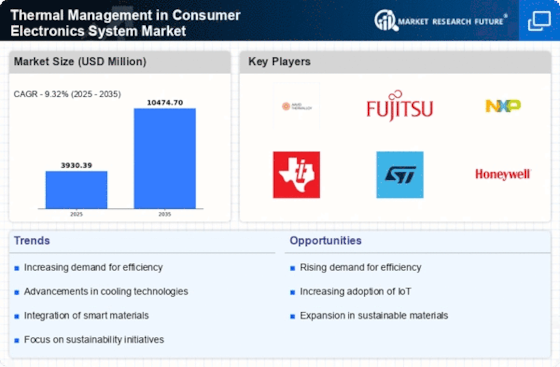Regulatory Standards and Compliance
Regulatory standards regarding energy efficiency and electronic waste are increasingly shaping the Thermal Management in Consumer Electronics System Market. Governments are implementing stringent regulations to promote sustainable practices and reduce environmental impact. For instance, compliance with energy efficiency standards can drive manufacturers to adopt advanced thermal management solutions that enhance energy performance. The market is witnessing a shift towards eco-friendly materials and designs, which not only comply with regulations but also appeal to environmentally conscious consumers. This regulatory landscape is likely to foster innovation in thermal management technologies, as companies strive to meet compliance while maintaining product performance.
Miniaturization of Electronic Devices
The trend towards miniaturization in the electronics sector is a crucial factor influencing the Thermal Management in Consumer Electronics System Market. As devices shrink in size, the challenge of heat dissipation becomes more pronounced. Smaller form factors lead to increased component density, which can elevate thermal loads. This situation necessitates the development of compact and efficient thermal management solutions. The market for wearable technology, for example, is expanding rapidly, with projections indicating a growth rate of approximately 10% annually. This trend underscores the need for innovative thermal management strategies that can effectively address the unique challenges posed by miniaturized devices.
Consumer Awareness and Demand for Reliability
Consumer awareness regarding the importance of device reliability and performance is a notable driver in the Thermal Management in Consumer Electronics System Market. As users become more informed about the implications of overheating and thermal throttling, they increasingly demand products that incorporate effective thermal management solutions. This trend is particularly evident in high-end electronics, where performance expectations are elevated. Market Research Future indicates that consumers are willing to pay a premium for devices that offer superior thermal performance. This shift in consumer behavior is prompting manufacturers to prioritize thermal management in their product designs, thereby stimulating growth in the market.
Rising Demand for High-Performance Electronics
The increasing consumer demand for high-performance electronics is a primary driver in the Thermal Management in Consumer Electronics System Market. As devices become more powerful, they generate more heat, necessitating advanced thermal management solutions. For instance, the market for smartphones and laptops is projected to grow significantly, with estimates suggesting a compound annual growth rate of over 5% in the coming years. This growth is likely to drive the need for efficient thermal management systems to ensure device reliability and performance. Manufacturers are thus compelled to innovate and integrate advanced thermal management technologies to meet consumer expectations, which further propels the market.
Growth of Electric Vehicles and Charging Infrastructure
The expansion of electric vehicles (EVs) and their associated charging infrastructure is emerging as a significant driver in the Thermal Management in Consumer Electronics System Market. As EV adoption increases, the demand for efficient thermal management systems in batteries and power electronics becomes critical. The market for EVs is expected to grow at a robust pace, with projections indicating a potential increase of over 20% annually. This growth necessitates advanced thermal management solutions to ensure battery longevity and performance. Consequently, manufacturers are investing in innovative thermal management technologies to address the unique challenges posed by EV systems, thereby propelling the market forward.














Leave a Comment